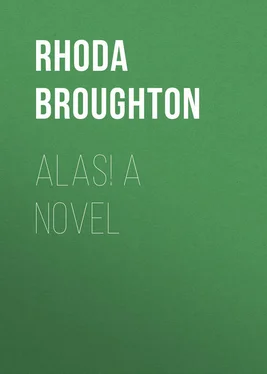Rhoda Broughton - Alas! A Novel
Здесь есть возможность читать онлайн «Rhoda Broughton - Alas! A Novel» — ознакомительный отрывок электронной книги совершенно бесплатно, а после прочтения отрывка купить полную версию. В некоторых случаях можно слушать аудио, скачать через торрент в формате fb2 и присутствует краткое содержание. ISBN: , Жанр: foreign_antique, foreign_prose, на английском языке. Описание произведения, (предисловие) а так же отзывы посетителей доступны на портале библиотеки ЛибКат.
- Название:Alas! A Novel
- Автор:
- Жанр:
- Год:неизвестен
- ISBN:http://www.gutenberg.org/ebooks/34428
- Рейтинг книги:4 / 5. Голосов: 1
-
Избранное:Добавить в избранное
- Отзывы:
-
Ваша оценка:
- 80
- 1
- 2
- 3
- 4
- 5
Alas! A Novel: краткое содержание, описание и аннотация
Предлагаем к чтению аннотацию, описание, краткое содержание или предисловие (зависит от того, что написал сам автор книги «Alas! A Novel»). Если вы не нашли необходимую информацию о книге — напишите в комментариях, мы постараемся отыскать её.
Alas! A Novel — читать онлайн ознакомительный отрывок
Ниже представлен текст книги, разбитый по страницам. Система сохранения места последней прочитанной страницы, позволяет с удобством читать онлайн бесплатно книгу «Alas! A Novel», без необходимости каждый раз заново искать на чём Вы остановились. Поставьте закладку, и сможете в любой момент перейти на страницу, на которой закончили чтение.
Интервал:
Закладка:
"He does not want to sing any more to-day," Jim hears her saying in her gentle voice; "you really are hurting him; he is too polite to say so; but you are squeezing him so tight that you really are hurting him. Why now" (with a little accent of pain), "you are hurting me ."
Jim has been looking with a lack-lustre eye out of the open window at the young plane trees exchanging their frowsy buds for infant leaves; at the one Judas tree pranking in its purple blossoms in the Piazza; but at that low complaint he makes one step across the room, and, whipping off Master Bertie alike from long-enduring dog and plaintive woman, stoops over the latter as she sits upon the floor, passing one hand over the other, upon which the child's angry fingers, transferred from his first victim, have left rosy prints of pain.
"I wish I had not come; I wish it was time to go home!" whimpers the little boy.
"Since he is so anxious to go home, I will take him, if you like," says Jim in a stiff voice; "I must be going myself."
She looks up at him from her lowly posture, a charming, half-apologetic, wholly peace-making smile fleeting across her small face, while she still chafes her hand – that little pinched hand which makes him feel so ridiculously tender.
"Are you, too, sorry that you came?" she asks.
The question takes him by surprise. He is not prepared for so friendly and almost intimate a sequel to her short, shy answers, and her abrupt quitting of him. He hesitates how to answer it; and as he hesitates, she rises and stands beside him. It is not easy for a grown person to rise gracefully from a seat on the floor. Jim catches himself thinking with what a roll and a flounder Cecilia would have executed the same manœuvre; but Elizabeth, supple and light, rises as smoothly as an exhalation from a summer meadow.
"If I was rude to you just now," she says, rather tremulously; "if I am ever rude to you in the future, I hope you will understand – I hope you will put it down to the fact that I – I – am very ignorant of – that I know very little of the world."
The two men are gone; so is the child; so is the dog; and Elizabeth is shutting up the piano and removing the score.
"What a noise we made!" she says, smiling at the recollection.
"If you make such a shocking noise again, the signora and the other lodgers will infallibly interfere."
Mrs. Le Marchant has followed her daughter, and now throws one arm about her slight neck, with a gesture of passionate affection.
"If you knew," she says, in a voice of deep and happy agitation, "what it was to me to hear you laugh as you did to-day!"
"I have a good many arrears in that way to make up, have not I, mammy? And so have you too," answers the younger woman, laying her sleek head down caressingly on her mother's shoulder; then, in a changed and restless voice: "Oh, if we could stop that man talking about the Moat! Why does he go on hammering about it?"
"Why indeed?" replies Mrs. Le Marchant with a shrug. "Men are so thick-skinned; but it is rather touching, his having remembered us all these years, is not it? For my part, I had almost entirely forgotten his existence – had not you?"
"Absolutely!" replies Elizabeth, with emphasis; "and if he will only let me, I am more than willing to forget it over again. Oh, mammy" (turning her face round, and burying it on her mother's breast), "why can't we forget everything? begin everything afresh from now – this delightful now ?"
CHAPTER XI
A reconciliation is seldom effected without some price being paid for it. Jim's with Elizabeth, if it can be called such, is bought at the cost of a small sacrifice of principle on his part. No later than this morning he had laid it down as a Median rule that he should avoid opportunities of finding himself in Miss Le Marchant's company; and yet, not only has he spent the major part of the afternoon in her society, but, as he walks away from her door, he finds that he has engaged himself to help Byng, on no distant day, in doing the honours of the Certosa Monastery to her and her mother. On reflection, he cannot quite explain to himself how the arrangement has come about. The proposal certainly did not originate with him, and still less with the two ladies so strangely shy of all society. The three have somehow been swept into it by Byng, who, either with the noblest altruism, or because he feels justly confident that he has no cause for jealousy of his friend (Jim's cynical reflection is that the latter is the much more probable reason), has insisted on drawing him into the project.
Jim Burgoyne is not a man whom, as a rule, it is easy either to wile or cudgel into any course that does not recommend itself to his own judgment or taste – a fact of which he himself is perfectly aware, and which makes him remorsefully acknowledge that there must indeed have been a traitor in the citadel of his own heart before he could have so weakly yielded at the first push to what his reason sincerely disapproves. But yet it is not true that remorse is the leading feature of his thoughts, as he walks silently beside his friend down the Via di Servi. It ought to be, perhaps; but it is not. The picture that holds the foreground of his memory is that of Elizabeth sitting on the floor, and sending him peace-offerings from her pathetic eyes and across her sensitive lips. It was very sweet of her to think it necessary to make him amends at all for her trifling incivility, and nothing could be sweeter than the manner of it. How gladly would he buy some little rudeness from her every day at such a price! But yet, as he thinks it over, the manner of it, the ground on which she rested her excuse, is surely a strange one. That she should attribute her light lapse from courtesy to want of knowledge of the world comes strangely from the mouth of a woman of six-and-twenty. If it be true – and there was a naïve veracity in lip and eye as she spoke – how is it to be accounted for? Has her mind, has her experience of life, remained absolutely stationary during the last ten years? Her tell-tale face, over which some pensive story is so plainly written, forbids the inference. It is no business of his, of course. Amelia, thank Heaven! has no story; but, oh! if someone would tell him what that history is! And yet, three days later, he voluntarily puts away from himself the opportunity of hearing it.
During those three days he sees no more of her. He does not again seek her out, and accident does not throw her in his way. He buys his Cantagalli dinner-service in company with Amelia; chooses the soup-tureen out of which he is to ladle mutton broth for the inhabitants of Westbourne Grove; he tastes of the wedding-cake that has cost Cecilia so dear, and he avoids Byng. On the third day he can no longer avoid him, since he is to occupy, as on the San Miniato occasion, the fourth seat in the fiacre which conveys himself and the Misses Wilson to the garden-party at the villa in Bellosguardo inhabited by Mrs. Roche, the mother of the amiable Bertie. The Wilsons' acquaintances in Florence are few, and, as far as Burgoyne has at present had the opportunity of judging, evil. It is, therefore, with a proportionate elation that Cecilia dresses for a party at which she will meet the bulk, or at least the cream, of the English society. It is to Byng's good nature that she and her sister owe the introduction to a hostess whose acquaintance is already too large to make her eager for any causeless addition to it; but whose hand has been forced by Byng, in the mistaken idea that he is doing a service to his friend Jim.
They are late in setting off, as Amelia is delayed by the necessity of soothing Sybilla, who has been reduced to bitter tears by a tête-à-tête with her father, in which that well-intentioned but incautious gentleman has been betrayed into suggesting to her that she may possibly be suffering from biliousness. The administering of bromide, to calm her nerves under such a shock; the reiterated assurances that every member of the family except its head realizes the monstrosity of the suggestion, take up so much time that Amelia herself has to reduce to a minimum the moments allotted to her own toilette. She has cried a little with Sybilla, for company partly, and partly out of weariness of spirit. That and hurry have swollen her eyelids, and painted her cheeks with a hard, tired red, so that it is an even more homespun figure and a homelier face than usual, that seat themselves opposite Burgoyne, when at length they get under weigh.
Читать дальшеИнтервал:
Закладка:
Похожие книги на «Alas! A Novel»
Представляем Вашему вниманию похожие книги на «Alas! A Novel» списком для выбора. Мы отобрали схожую по названию и смыслу литературу в надежде предоставить читателям больше вариантов отыскать новые, интересные, ещё непрочитанные произведения.
Обсуждение, отзывы о книге «Alas! A Novel» и просто собственные мнения читателей. Оставьте ваши комментарии, напишите, что Вы думаете о произведении, его смысле или главных героях. Укажите что конкретно понравилось, а что нет, и почему Вы так считаете.












